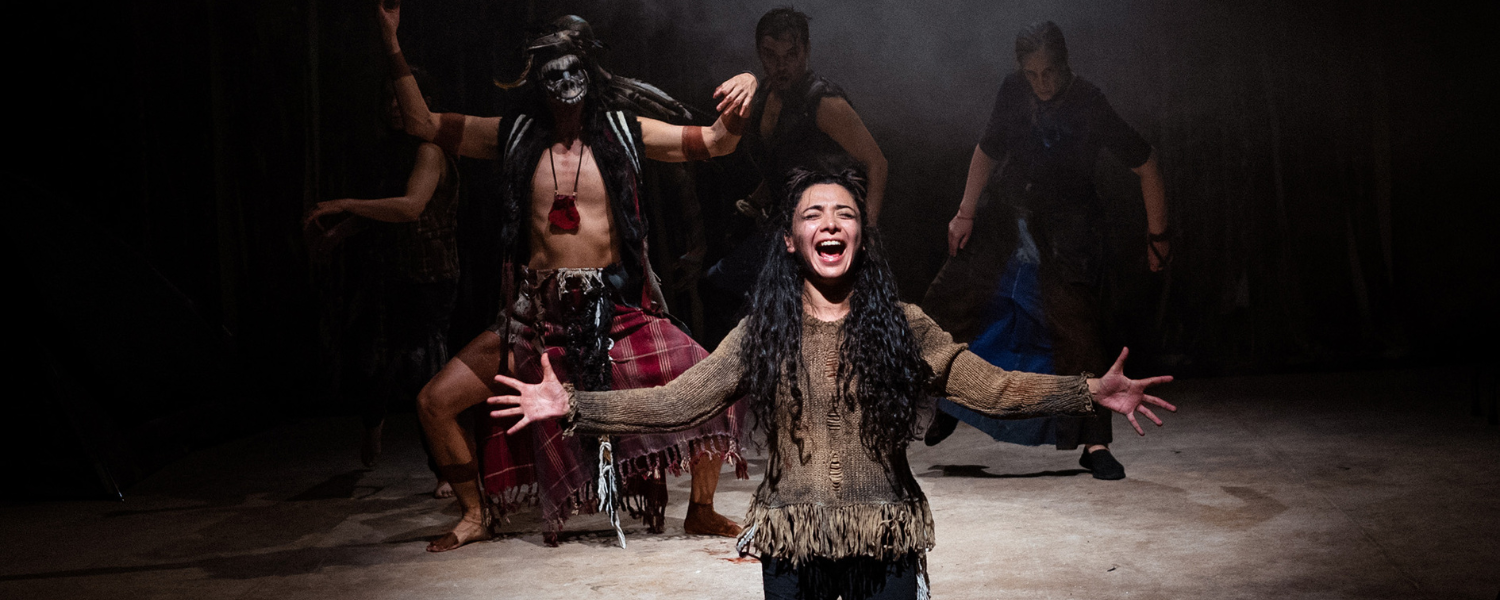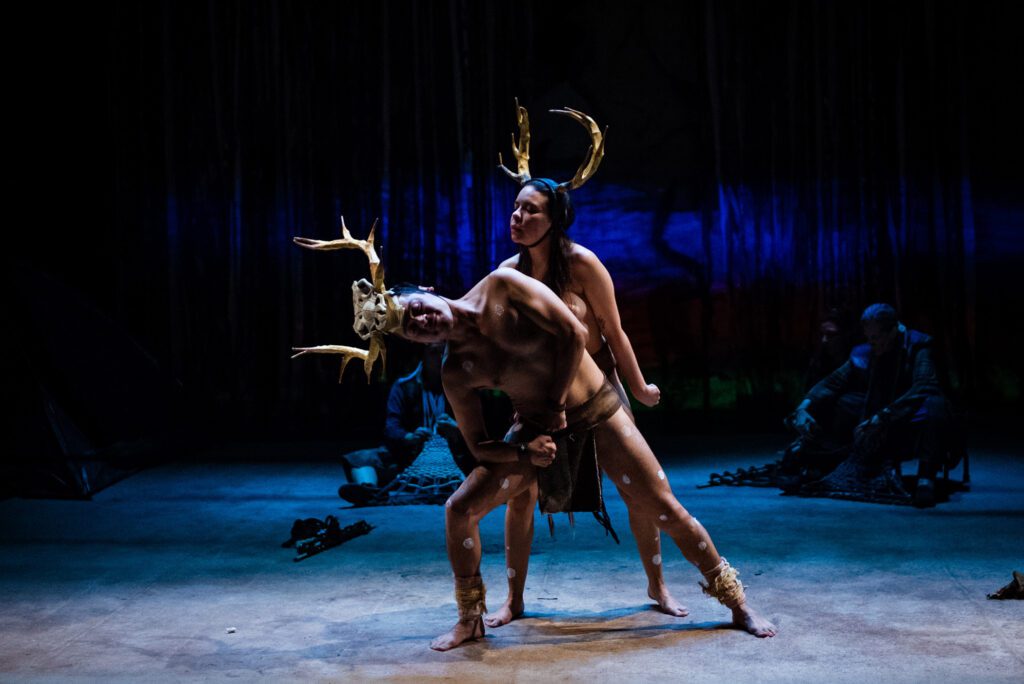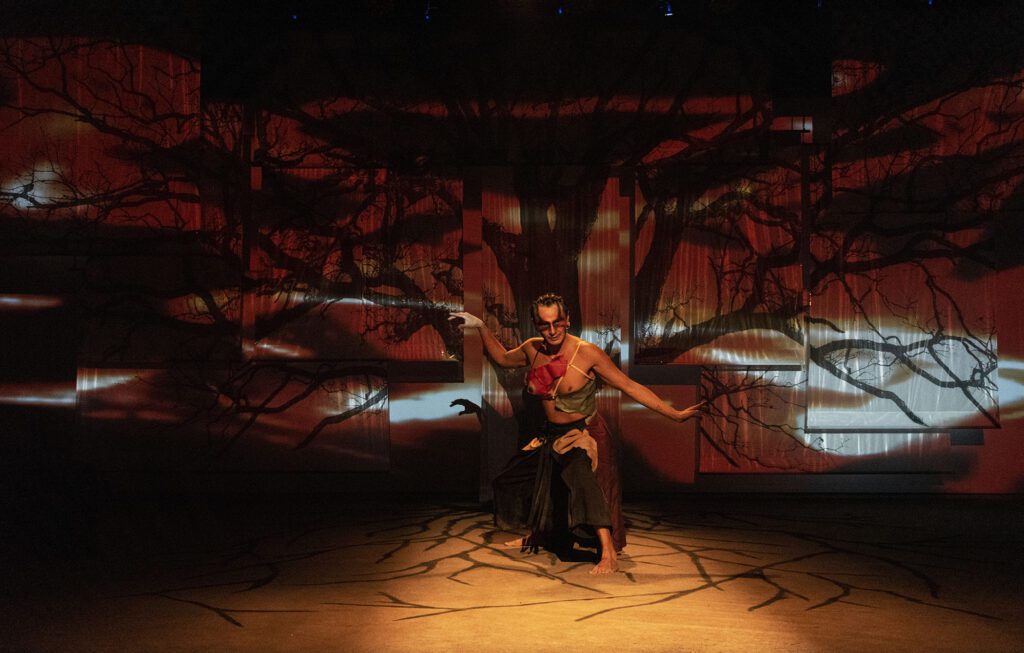Review – Pueblo Espíritu

Pueblo Espíritu devised by Organización Secreta Teatro
Reviewed by Amanda L. Andrei
Clutching their face masks and backpacks, four exhausted individuals stumble into a strange forest. Nerves clearly shot, they spray disinfectant at each other and come to blows, but not before a fifth person appears, coughing so hard that they fall to the ground. In the ensuing silence and weight of paranoia, the individuals surrender to their fatigue—and to the spirits of the surrounding land.
So starts Pueblo Espíritu (“Spirit Town”), a wordless multimedia performance devised by Mexico City’s experimental Organización Secreta Teatro and directed by company founder Rocío Carrillo. Wordless, yet carried by character grunts and overhead music swelling with drums and chants, the ensemble (Beatriz Cabrera, Alejandro Joan Carmarena, Brisei Guerrero, Stefanie Izquierdo, Ernesto Lecuona, Mercedes Olea, and Jonathan Ramos) remake their post-apocalyptic environment by communing with the wildness of the spiritual world and returning to embodied material-making practices, such as weaving and ceremonial medicine.

There’s still peril in the spiritual world, though, and tension between physical, social, and spiritual boundaries explored more through dream logic than by way of any definitive storyline. A gloriously painted bird-entity (Carmarena) seems to have power over the dead, but is also susceptible to the tricks of a feral girl (Izquierdo) who appears to be negotiating her status as human, animal, and warrior.
A medicine man (Ramos) leads the group in a ceremony where a fierce feminine divinity arises and dances amidst dangerous laughter (Guerrero), while afterwards an archer and hunter (Lecuona) deals with a terrifying apparition and deer-like spirit (Cabrera) in what could be a nightmare or the birth of something more sinister.
An elderly woman (Olea) observes and absorbs much of this pain, sometimes serving as a guide and other times as a witness.
Carrillo’s direction steers the ensemble between swift dances, tender embraces, and erotic animalistic movements to portray the porous interdimensionality of the worlds. Erika Gomez’s design conjures up a lavish natural world, yet one still marred by civilization and prone to interruption. The mask and makeup elements are particularly inspired and detailed, turning ordinary humans into supernatural creatures in mere moments.
If I could change one thing about the production, I would wish for better audio quality or live performance of the music. While the melodies are epic and reminiscent of traditional indigenous songs, the overheard sound and its slightly tinny quality could be distracting, and moments of the actors lip-synching or chanting along with the soundtrack lent me a slight feeling of uncanny disembodiment, a friction between the digital and the live performance clashing with my visual and aural senses in a way that took me outside of this otherwise enchantingly bewildering world.
However, this friction made silences onstage and any subsequent ensemble noises (sans sound) even more poignant and profound, as the echoes faded and wrapped the audience within a reverent stillness.
While Pueblo Espíritu has a limited run at the Latino Theater Company with only five performances until May 7, the ensemble will also be performing Las Diosas Subterráneas (“Subterranean Goddesses”), an experimental adaptation of the Greek myth of Persephone (the maiden goddess kidnapped by the god of the underworld) juxtaposed with the story of Luz García, a character based on real-life women kidnapped by human traffickers.
With these two stories intertwining, the ensemble seeks to portray the story of mothers looking for their missing daughters while finding strength in community. With these two performances, Organización Secreta Teatro gives us an entryway into vigorously magical worlds, inviting us to examine our own relationships with spirit, land, and power.

Pueblo Espíritu had five performances, concluding on May 7.
Las Diosas Subterráneas performs the following week, on Wednesday, May 10 at 8 p.m.; Thursday, May 11 at 8 p.m.; Friday, May 12 at 8 p.m.; Saturday, May 13 at 8 p.m.; and Sunday, May 14 at 4 p.m.
Tickets range from $22–$48, except opening night (May 3), which is $58 and includes pre- and post-show receptions. The Los Angeles Theatre Center is located at 514 S. Spring St., Los Angeles, CA 90013. Parking is available for $8 with box office validation at Joe’s Parking structure, 530 S. Spring St. (immediately south of the theater).For more information and to purchase tickets, call (213) 489-0994 or go to www.latinotheaterco.org
Pueblo Espíritu photos by Ángela Chapa
Las Diosas Subterráneas photo by Erika Gómez
Reviewer Amanda L. Andrei is a Filipina Romanian American playwright, literary translator, and teaching artist residing in Los Angeles by way of Virginia/Washington DC. She writes epic, irreverent plays that center the concealed, wounded places of history and societies from the perspectives of diasporic Filipina women, and she translates from Romanian and Filipino to English. For more information on her work and upcoming events, visit: www.AmandaLAndrei.com

SUPPORT SEEFEST
Not a member yet? Become an art patron with other SEEfest arthouse aficionados in support of great events and programs, as well as our mission to keep you informed about initiatives from our wide network of fellow cultural organizations.
We Welcome YOU!
57th Annual Thessaloniki Film Festival Begins This Week
SEEfest Staff Writer | November 1, 2016, 4:06 PM
This week kicks off the 57th Annual Thessaloniki International Film Festival in Greece. The festival is held at the Olympion Theater- a magnificent piece of architecture which was built in the 1920’s and sits in the center of the city. Every year hundreds of films are shown at the festival, and this year introduces new program sections and welcomes three films of the Official Competition of the European Parliament’s Lux Prize.
It’s a special festival that’s consistently celebrated much talent over the years. Among this talent is Dimitri Kerkinos who has been showcasing Balkan cinema for years, and consistently brings selections of the SEE region’s finest films to the TIFF audience.
Below, you will find info from TIFF on the Balkan Survey program:
BALKAN SURVEY
For 23 years the Thessaloniki International Film Festival’s Balkan Survey section, curated by Dimitri Kerkinos, has been showcasing the best samples of the Balkan area’s film production. A variety of film genres and styles coupled with a genuinely engaging approach of contemporary issues describe this year’s Balkan offerings. The 57th TIFF Balkan Survey also celebrates the work of Turkish auteur Zeki Demirkubuz by presenting -for the first time internationally- a full retrospective of his films. The filmmaker will be in Thessaloniki to introduce his work to the Festival’s audience.
Directors in attendance also include Cristi Puiu (Romania), Paul Negoescu (Romania), Reha Erdem (Turkey), Bariş Kaya (Turkey), Faton Bajraktari(UNMI Kosovo), Ana-Felicia Scutelnicu (Moldavia) and Petar Valchanov (Bulgaria), whose new films will also be screened in the 57th TIFF.
Zeki Demirkubuz Tribute
“Sometimes I think that if it wasn’t for jail, I would not be a filmmaker.” -Zeki Demirkubuz
Pioneer of the new Turkish independent cinema Zeki Demirkubuz was born in Isparta, Turkey, in 1964. Following the 1980 military coup, his left-wing beliefs led him to prison for three years, at age 17. It was there that he found inspiration in the work of Fyodor Dostoyevsky and went on to create film characters born and bred in the Turkish society. Demirkubuz’s cinema is deeply existential and contemplative; it elegantly reflects class and sex discriminations with exceptional realism and sensitivity. His films are a multi-faceted examination of both the Turkish society and the human psyche.
Demirkubuz began his film career as assistant director to Zeki Ökten in 1986, and worked as such for various filmmakers until making his feature film debut Block C (1994), about a middle-class housewife struggling to escape from her boring life and society’s conflicting expectations of the role of women. The film established Demirkubuz’s style and themes. After this, he continued to work as an independent filmmaker writing his own original screenplays.
His second feature Innocence (1997) –a complex study of love, loss and human obsessions-, drew the attention of film critics and international audiences and redefined the melodrama genre, becoming also one of the most influential films in new Turkish cinema. The Third Page (1999) is a film about fate and moral dilemmas that evokes Dostoevsky’s “Crime and Punishment”, featuring another handful of the director’s trademark marginalized characters. Demirkubuz’s “Tales of Darkness” trilogy masterfully explores guilt, morality and freedom in three riveting films: Fate (2001) –loosely based on Camus’ “The Stranger”-, Confession (2001) and The Waiting Room (2003), which features the director as protagonist. Destiny (2006) traces the characters of Innocence in their youth, introducing us to the chronicle of an unrequited love, where desire haunts everyone’s fate. The intense period drama Envy (2009) captures the darkest side of human emotions, unfolding a tale of beauty and ugliness, jealousy and lust. Inside (2012), a free adaptation of Dostoevsky’s “Notes from Underground”, also delves into the abyss of the soul, focusing on a self-destructive man driven by hatred and revenge. Nausea (2015) is a character study of another disturbing male personality; an emotionless man (played by Demirkubuz himself) who loses his family and surrenders to apathy and meaningless affairs.
The director’s latest film Ember (2016) is another thorough, slow burning examination about a society trapped in the past, confirming once more why Demirkubuz is established as one of the most important filmmakers of the independent European cinema.
With the support of the Culture & Tourism Office of the Turkish Embassy in Athens:
The Balkan Survey Films:
The Balkan Survey main program presents the latest and most notable works by renowned filmmakers of the region, as well as promising newcomers.
Cristi Puiu returns with Sieranevada (Romania’s official Oscar submission for Best Foreign Language Film) and zooms in a family that reunites to honour their late patriarch in a meal which keeps getting postponed; people and conversations come and go, while secrets and truths emerge unexpectedly in this comedy/drama with surreal hues. Also from Romania, Bogdan Mirica’s gripping debut Dogs (FIPRESCI prize, Un Certain Regard – Cannes Film Festival) is a violent western about the story of a man who inherits his grandfather’s land in the countryside; soon he will brutally confront the local mafia, whose lord was his deceased relative. Set in 1937, in a sanatorium on the Black Sea coast, Radu Jude’s latest film Scarred Hearts -based on the autobiographical novel from Max Blecher-, is an intriguing drama about a young man suffering from bone tuberculosis; he quickly becomes part of the hospital’s microcosm, where friendship, love and politics thrive despite the circumstances. On a lighter tone, Paul Negoescu’s comedy Two Lottery Tickets is an entertaining road movie in which three friends set off on a journey to retrieve their lost lottery ticket.
Serbian actress Mirjana Karanović makes her directorial debut with the film A Good Wife, where she also stars as the main character; a woman who is devastated to discover that her husband is involved in horrific war crimes.
Reha Erdem’s modern fairytale Big Big World, filled with both beauty and violence, shares the story of a brother and a sister who flee into a dazzling forest after a crime is committed (Special Jury Prize, Venice Horizons-Venice Film Festival). Mehmet Can Mertoğlu’s first feature Album is an irrational comedy that reflects upon the contemporary Turkish society through the story of a couple who try to conceal that they adopted a child (France 4 Visionary Award, Semaine de la Critique-Cannes Film Festival). In Bariş Kaya and Soner Caner’s bittersweet debut Rauf, a young boy embarks on a journey in search of pink fabric for the girl he loves, facing the hardships of the adult world, amidst a turbulent socio-political situation.
An honest man becomes the pawn of a PR plan organized and executed by the government, in Kristina Grozeva and Petar Valchanov’s Glory; a poignant, tragicomic satire about politics and corruption.
Ana-Felicia Scutelnicu’s Anishoara observes the life of a teenage girl who falls in love for the first time; an almost silent and truly captivating coming-of-age story, set in the ravishing Moldavian countryside, a place forgotten in time.
Two films of the Balkan Survey section delve into the aftermath of the war. In Zrinko Ogresta’s On the Other Side, a traitor who fought for “the other side” reappears and disrupts his family’s balances in this powerful psychological drama with exemplary script and plot twist (Label Europa Cinemas – Special Mention-Berlin Film Festival / Croatia’s official Oscar submission). Faton Bajraktari’s debut film Home Sweet Home points to the absurdity of the post-war society by unfolding the story of a man considered dead in battle; when he suddenly returns to his family, he realizes that their prosperity relies exclusively on his death (UNMI Kosovo’s official Oscar submission for Best Foreign Language film).
In addition, the Balkan Survey section of the 57th TIFF will present 5 short films that skilfully tackle with various significant themes, such as the refugees issue (A New Home by Žiga Virc), gender (Transition by Milica Tomovic) and father-son relations (The Beast by Miroslav Sikavica, The Son by Hristo Simeonov), but also shed a humorous light on modern Balkan living (A Night in Tokoriki by Roxana Stroe).
Support international cinema in Los Angeles and new film talent from South East Europe. Donate here!





